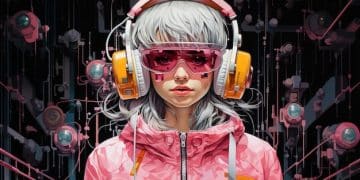The Rise of Virtual Idols: AI Shaping K-Pop’s Future in 2025

The Rise of Virtual Idols: How AI is Shaping the Future of K-Pop in 2025 explores how artificial intelligence is revolutionizing the K-Pop industry, creating virtual performers, enhancing music production, and offering personalized fan experiences, predicting significant changes by 2025.
The convergence of K-Pop and artificial intelligence is no longer a distant dream but a rapidly approaching reality. The rise of virtual idols: How AI is shaping the future of K-Pop in 2025 is set to redefine how we perceive music and entertainment.
The Genesis of Virtual Idols
Virtual idols are not entirely new, but their sophistication and integration into the K-Pop scene are reaching unprecedented levels. Let’s delve into the origins of virtual idols and their increasing presence in pop culture.
Early Examples of Virtual Performers
Virtual performers have existed for decades, often in the form of animated characters or digital avatars used for specific performances or music videos. These early examples laid the groundwork for today’s sophisticated virtual idols.
Advancements in AI and CGI Technology
Significant advancements in artificial intelligence and CGI (Computer-Generated Imagery) technologies have propelled the development of virtual idols. AI algorithms can now generate realistic movements, expressions, and even voices, making virtual idols more lifelike and engaging.
- AI-driven facial animation
- Real-time motion capture technology
- Deep learning for voice synthesis
The advancements in these technologies have helped bridge the gap between virtual and real-world performances, making virtual idols a viable and exciting option in the K-Pop industry. These technologies continue to evolve, promising even more realistic and immersive virtual idol experiences.
In summary, the genesis of virtual idols can be traced back to early experiments with digital characters, but modern AI and CGI technologies have dramatically enhanced their capabilities. This evolution has positioned virtual idols as a significant force in the future of K-Pop.
AI-Driven Music Production
AI isn’t just creating virtual faces; it’s also transforming music creation itself. Discover how AI is revolutionizing music production, from composition to mastering.

Automated Composition and Arrangement
AI algorithms can now compose original music and create arrangements, which significantly reduces the time and resources needed for song creation. This automation empowers artists and producers to explore new musical territories and styles.
Enhancing Voice and Sound Quality
AI is also used to enhance voice and sound quality, correct errors, and fine-tune recordings. This ensures that virtual idols produce high-quality music that rivals that of their human counterparts.
- AI-powered mastering tools
- Algorithmic noise reduction
- Voice cloning and modification
The development of virtual idols relies heavily on AI-driven tools that enhance the overall quality and appeal of their music. These tools offer new possibilities for creativity and innovation in K-Pop, where high production standards are paramount.
To conclude, AI is becoming increasingly integral to music production, providing the tools necessary for virtual idols to create compelling and competitive music. This technological shift promises to revolutionize the K-Pop landscape.
The Appeal of Virtual Idols: Why Fans Are Drawn In
Virtual idols may seem unconventional, but they possess a unique appeal that resonates with fans. Let’s examine the factors that contribute to their popularity.
Customization and Control
Fans are often drawn to virtual idols because they offer a level of customization and control not found with human artists. Virtual idols can be tailored to meet specific fan preferences and even evolve based on fan feedback.
Consistent Performance and Availability
Virtual idols can perform consistently without the constraints of physical limitations or scheduling conflicts. Their constant availability makes them highly reliable and accessible to fans around the world.
Virtual idols represent a new form of entertainment that caters to the evolving preferences of K-Pop fans. Their unique attributes and capabilities make them increasingly attractive as the industry continues to evolve.
Challenges and Controversies
Despite their growing popularity, virtual idols are not without their challenges and controversies. It’s important to address these issues to gain a comprehensive understanding of their place in the K-Pop industry. Several challenges and controversies must be addressed.

Ethical Concerns and Authenticity Debate
The creation and promotion of virtual idols raise ethical concerns about the use of AI in entertainment and the authenticity of these performers. Critics question whether virtual idols can genuinely connect with fans or if they are merely manufactured commodities.
Job Displacement for Human Artists
Some worry that the rise of virtual idols could lead to job displacement for human artists, reducing opportunities for aspiring K-Pop stars. This concern highlights the need for careful consideration of the economic impact of virtual idols on the broader entertainment industry.
- Intellectual property rights
- Emotional connection with fans
- Cultural impact on the K-Pop industry
Addressing these challenges and controversies is crucial for ensuring the sustainable and ethical integration of virtual idols into the world of K-Pop. Open discussions and thoughtful regulations can help mitigate potential negative impacts and unlock the full potential of this innovative technology.
By acknowledging and addressing these challenges, the K-Pop industry can pave the way for a future where virtual idols and human artists coexist and complement each other.
Future Predictions: K-Pop in 2025
Looking ahead to 2025, what can we expect from the integration of virtual idols in K-Pop? Here are a few predictions based on current trends and technological advancements.
Increased Integration with Virtual Reality
Virtual reality (VR) will likely play a significant role, allowing fans to interact with virtual idols in immersive and personalized environments. VR concerts and fan meetings could become commonplace.
Hyper-Personalized Fan Experiences
Thanks to AI, fan experiences will become hyper-personalized. Virtual idols will be able to adapt their performances, appearances, and interactions to suit individual fan preferences, creating a strong sense of connection and loyalty.
In 2025, K-Pop is poised to undergo a significant transformation, driven by the integration of virtual idols and advanced AI technologies. These changes will not only alter the way music is produced and consumed but also redefine the relationship between artists and fans.
How Virtual Idols Are Changing Fan Engagement
Virtual idols are radically reshaping how fans connect with their favorite artists. Their digital nature allows for unique interactions that were previously unimaginable.
Interactive Livestreams and Q&A Sessions
Virtual idols can host interactive livestreams where fans can directly influence the performance through real-time polls. Q&A sessions can be more engaging as AI can analyze fan questions and tailor responses for a more personal touch.
- Personalized messages and shout-outs
- Virtual meet-and-greets
- Co-creation of music and content
By enabling fans to participate actively in their idol’s activities, virtual idols are fostering stronger, more personal connections. This level of engagement not only increases fan loyalty but also opens up new avenues for creative collaboration.
In summary, virtual idols are not just performers; they’re creating a new paradigm for fan engagement. Through innovative digital interactions, they offer personalized experiences that deepen the bond between artist and audience.
| Key Point | Brief Description |
|---|---|
| 🤖 AI-Driven Music | AI enhances music production, offering automated composition and improved sound quality. |
| 💖 Fan Appeal | Fans enjoy customization and consistent performance, drawing them to virtual idols. |
| 🤔 Ethical Concerns | Ethical debates arise over authenticity and potential job displacement for human artists. |
| 🔮 Future Trends | Expect increased VR integration and hyper-personalized fan experiences by 2025. |
FAQ
▼
Virtual idols are AI-created digital performers that sing, dance, and interact with fans. They are designed to be customizable and available 24/7, offering a unique form of entertainment.
▼
AI automates composition and enhances voice and sound quality in K-Pop. It can also correct errors and fine-tune recordings, making music production more efficient and innovative.
▼
Fans are drawn to virtual idols because of their customization options and consistent performance. These idols offer unique and personalized experiences that resonate with a digital-native audience.
▼
Ethical concerns include the authenticity of these performers and the potential job displacement for human artists. There are also questions about the emotional connection between fans and AI entities.
▼
The future includes increased integration with virtual reality (VR) and hyper-personalized fan experiences. Virtual idols will adapt to individual preferences, enhancing the sense of connection and loyalty.
Conclusion
The integration of AI and virtual idols into K-Pop represents a paradigm shift, offering new avenues for creativity, fan engagement, and technological innovation. While challenges and ethical questions remain, the future of K-Pop in 2025 promises to be a dynamic and transformative landscape shaped by the rise of virtual performers, revolutionizing how we create, consume, and connect with music.






